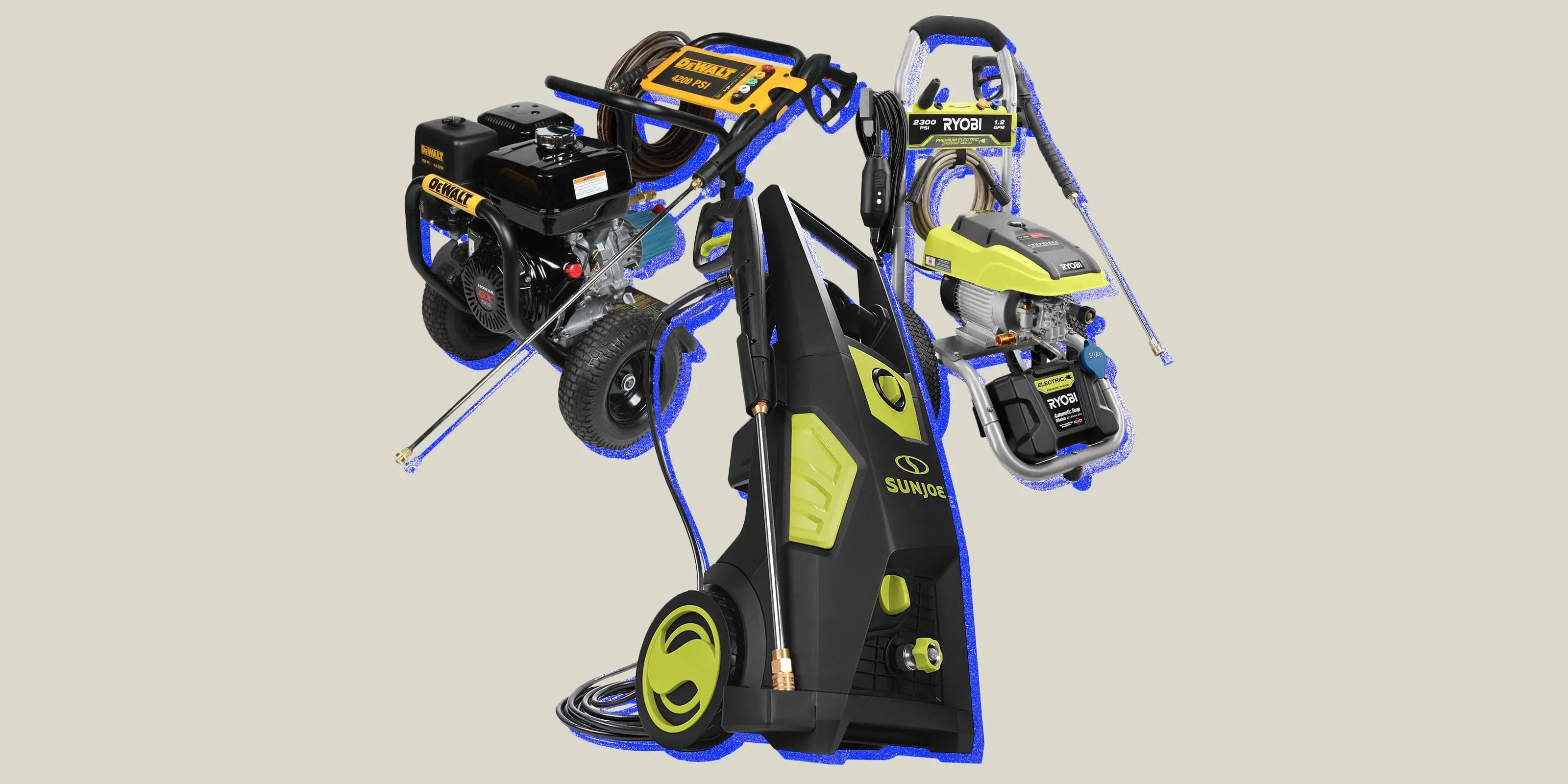Whether you need to clean your deck, your car or your driveway, sometimes your standard garden hose just isn’t going to cut it. Hoses simply lack the water pressure required for tougher cleaning jobs, so when you’ve got a really dirty job to do, it’s best to get a pressure washer. Pressure washers — sometimes called power washers — utilize a pressurized stream of high-pressure water to blast away dirt and grime, leaving your project clean as a whistle.
Products in the Guide
-
Ryobi 2300 PSI 1.2 GPM High Performance Electric Pressure Washer
Best Overall Pressure Washer
Read more -
DeWalt DXPW60605
Best Upgrade Pressure Washer
Read more -
Sun Joe SPX3500
Best Budget Pressure Washer
Read more -
Ryobi 3000
Best Electric Pressure Washer
Read more -
Westinghouse WPX Max
Best Gas Pressure Washer
Read more -
Stanley SHP2150
Best Pressure Washer for Cars
Read more
What to Look for in a Pressure Washer
PSI
PSI stands for “pounds per square inch” and it’s the pressure rating for your pressure washer. Basically, this tells you how powerful the stream is, and it will determine what kinds of jobs you’ll be able to use your power washer for. Generally speaking, pressure washers are categorized into three groups based on their PSIs:
Light Duty: These washers max out below 1,900 PSI and are used in situations where too much pressure could cause damage, such as delicate areas of your home like gutters.
Medium Duty: Ranking between 1,900 and 2,788 PSI, these mid-range pressure washers are better suited to your bigger jobs around the house, like cleaning off your deck or siding.
Heavy Duty: These are your big boys, reserved for the toughest and dirtiest jobs. Stripping paint, blasting oil spots off of your driveway — that sort of thing. These will have PSIs of 2,800 or more (typically at least 3,000 PSI) and should only be used on surfaces that won’t be damaged by such high pressure.
GPM
After PSI, the other big measurement to look out for when shopping for pressure washers is GPM or “gallons per minute.” This is a calculation of how much water your pressure washer is using, rather than how strong your stream is. If it’s pumping out more water, then you’ll be able to cover a larger area more quickly. So, a higher GPM translates to a better-performing pressure washer. Like with PSI, GPMs typically correspond with a pressure washer’s use case, with low GPMs of 0.5-2 being seen on light-duty power washers, 1-3 GPM on medium-duty and 2-4 GPM ratings on heavy-duty pressure washers.
CU
CU stands for “cleaning units,” and it’s the best overall measurement to take into consideration when you’re trying to figure out the efficiency of a power washer. Even if the pressure washer you’re looking at doesn’t give a CU rating, the measurement is simple to calculate. All you do is multiply PSI x GPM. So, for example, if a pressure washer has a PSI of 2,000 and a GPM of 1.5, then it has 3,000 cleaning units.
Gas vs Electric
Like most lawn and garden equipment, pressure washers are available in both gas- and electric-powered versions, with each offering its own pros and cons. Electric power washers are lighter, quieter and easier to use — you just plug them in and go. The drawbacks are that they’re often weaker than their gas-powered counterparts, and because they need to be plugged in (cordless versions do exist, but are even weaker), you have less freedom of movement.
Gas-powered power washers are a good deal heavier and more of a hassle to deal with since you need to buy gasoline and fill them with it in order for them to run. They’re also louder and smellier because of the gas and combustion. On the plus side, because you don’t need to plug them in, you do get more freedom of movement with a gas pressure washer, and the high end of their PSI and GPM are going to be greater than those of the most powerful electric pressure washers.
Ryobi 2300
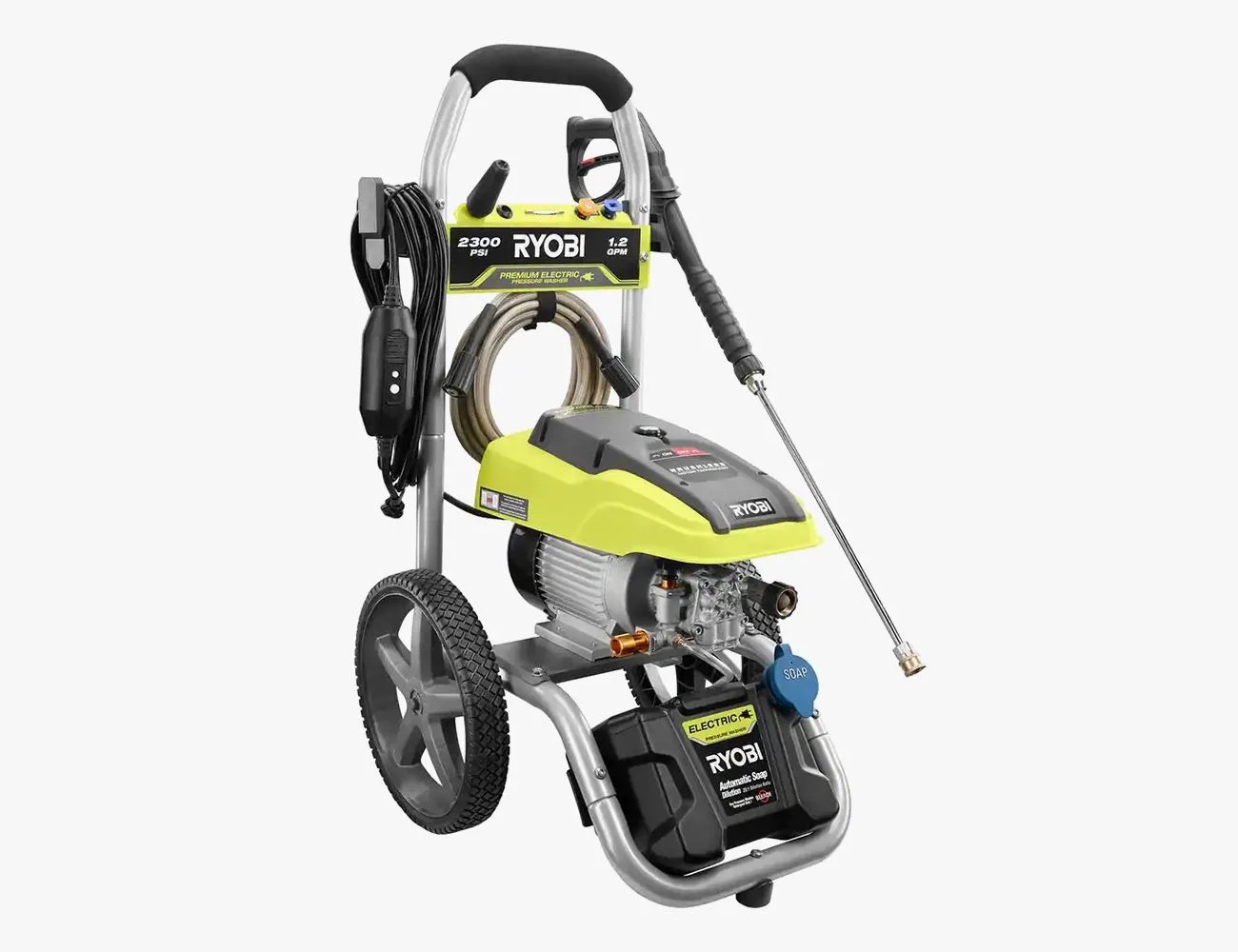 Home Depot
Home DepotBest Overall Pressure Washer
Ryobi 2300 PSI 1.2 GPM High Performance Electric Pressure Washer
Pros
- Suitable for most residential tasks
- Gas-style axial cam pump offers great efficiency
Cons
- Has some cheap-feeling plastic parts
- PSI: 2,300
- GPM: 1.2
- CU: 2,760
- Power: Electric
Ryobi is the pressure washer industry’s top brand, and this is arguably its signature model. With a medium-duty PSI of 2,300 and 1.2 GPM, this electric power washer sits right at the center of most people’s needs. You’re not going to use it for stripping paint off your deck or anything too extreme, but for the bulk of chores for which most people would want to use a pressure washer — washing your windows, cleaning your fence, rinsing off your patio furniture — this pressure washer is a dream. It’s powered by a 13-amp brushless motor that’s paired with an axial cam pump as you’d normally see on a gas-powered pressure washer, insuring that you’re squeezing as much power as possible out of the electric motor. This washer also features tons of extra touches that make it convenient for home use, like a 25-foot non-marring hose, an onboard soap tank and a “Turbo” Pressure nozzle that boosts your pressure up to 50%. Again, this 49-pounder isn’t the pressure washer you’ll want for heavy-duty jobs, and some reviewers have complained about cheap plastic parts, but for most of us, this’ll get the job done.
DeWalt DXPW60605
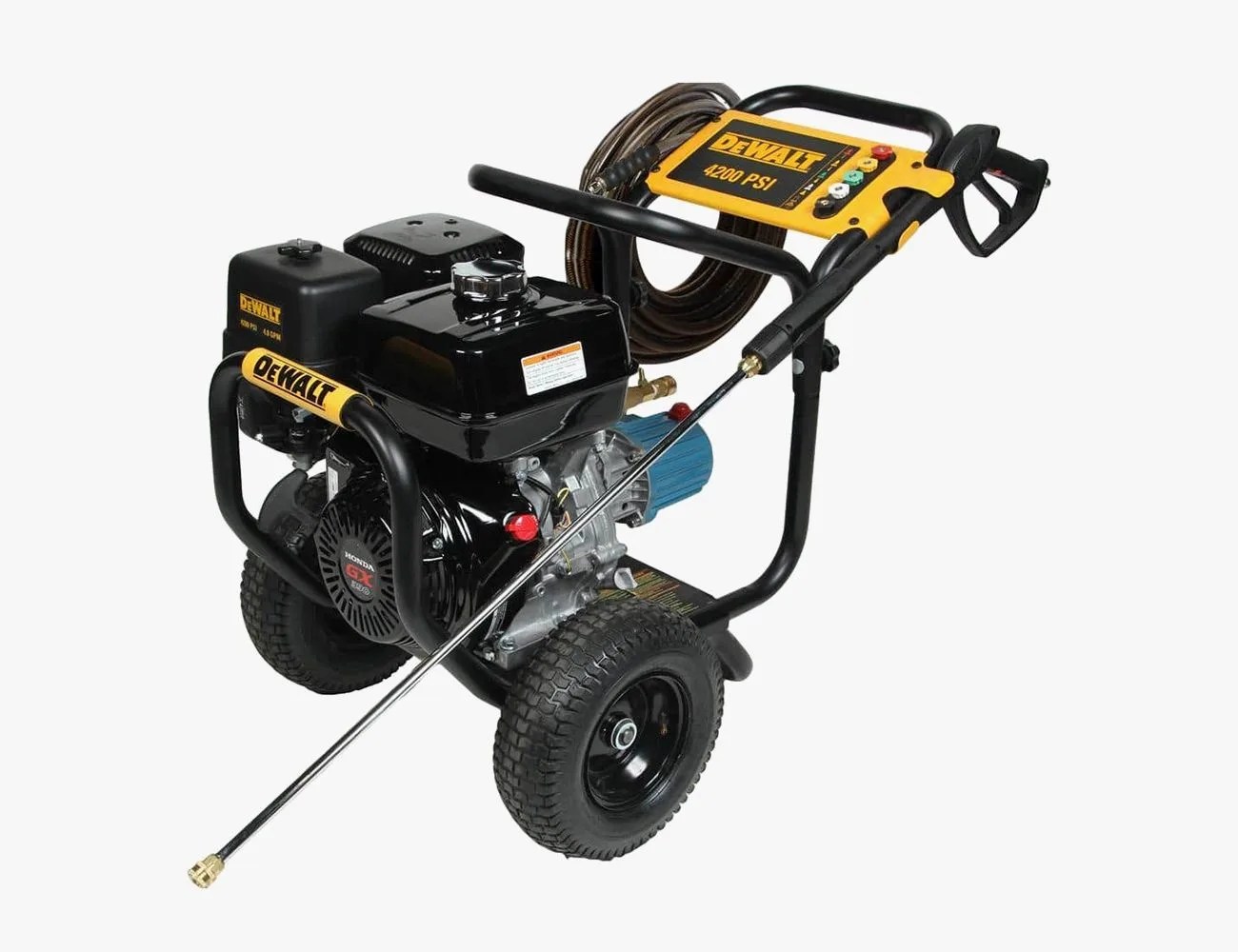 Home Depot
Home DepotBest Upgrade Pressure Washer
DeWalt DXPW60605
Pros
- Insanely high 16,800 CU rating
- Capable of industrial-level pressure washing
Cons
- Very heavy at 157lb
- Overkill for most people and jobs
- PSI: 4,200
- GPM: 4.0
- CU: 16,800
- Power: Gas
Now, on the other hand, if you do have some heavy-duty cleaning or stripping to do, this DeWalt rig will handle whatever you throw at it. With top levels of 4,200 PSI and 4 GPM, this unit boasts a massive 16,800 cleaning units — more than four times what you’ll find on many medium-duty power washers. All that power is derived from a Honda GX390 gas engine, and if there’s one thing that comes to mind about Honda, it’s reliability. This beast of a pressure washer is ideal for massive jobs like graffiti removal and cleaning caked-on debris from construction and farm equipment, but it’s built in such a way that you yourself won’t get soaked while using it. That’s thanks to the 31-inch steel wand that attaches to the ergonomic spray gun, which keeps the spray far away from you. But unless you’ve got some industrial-sized cleaning to do, this expensive and heavy (157 pounds) machine is simply going to be too much for you.
Sun Joe SPX 3500
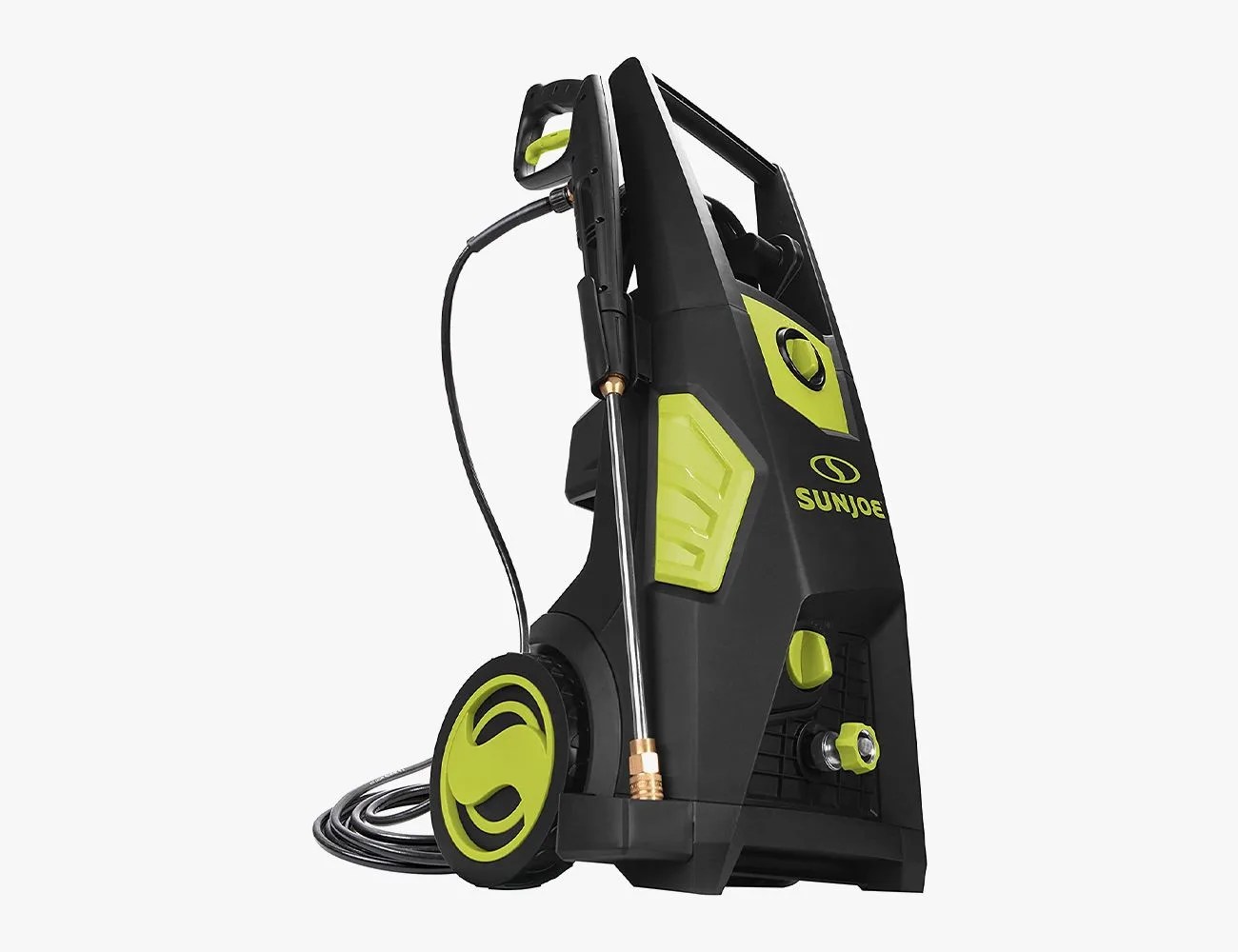 Amazon
AmazonBest Budget Pressure Washer
Sun Joe SPX3500
-
$245.00 (6% off)
Pros
- A bargain for a medium-duty pressure washer
- Detergent dial makes it easy to use the right amount of soap
Cons
- Actual usable PSI is lower than advertised
- PSI: 2,300
- GPM: 1.48
- CU: 3,404
- Power: Electric
Even if you’re only spending around $250, you can still get a pressure washer that’s plenty capable for the vast majority of residential work. Case in point, this popular model from Sun Joe, which has close to 5,000 five-star ratings on Amazon. With over 3,400 CU, this electric power washer bests much of the competition in its price range. This pressure washer puts a big emphasis on cleaning, with a large 1.2l soap tank and a handy detergent dial that lets you easily adjust how much cleaning agent you’ll need for a particular job. And while this is a medium-duty power washer, we’d recommend it mostly for lighter work. While the maximum pressure rating is 2,300 PSI, that’s measured at the pump. The actual working pressure coming out of the hose maxes out at around 2,000 PSI.
Ryobi 3000
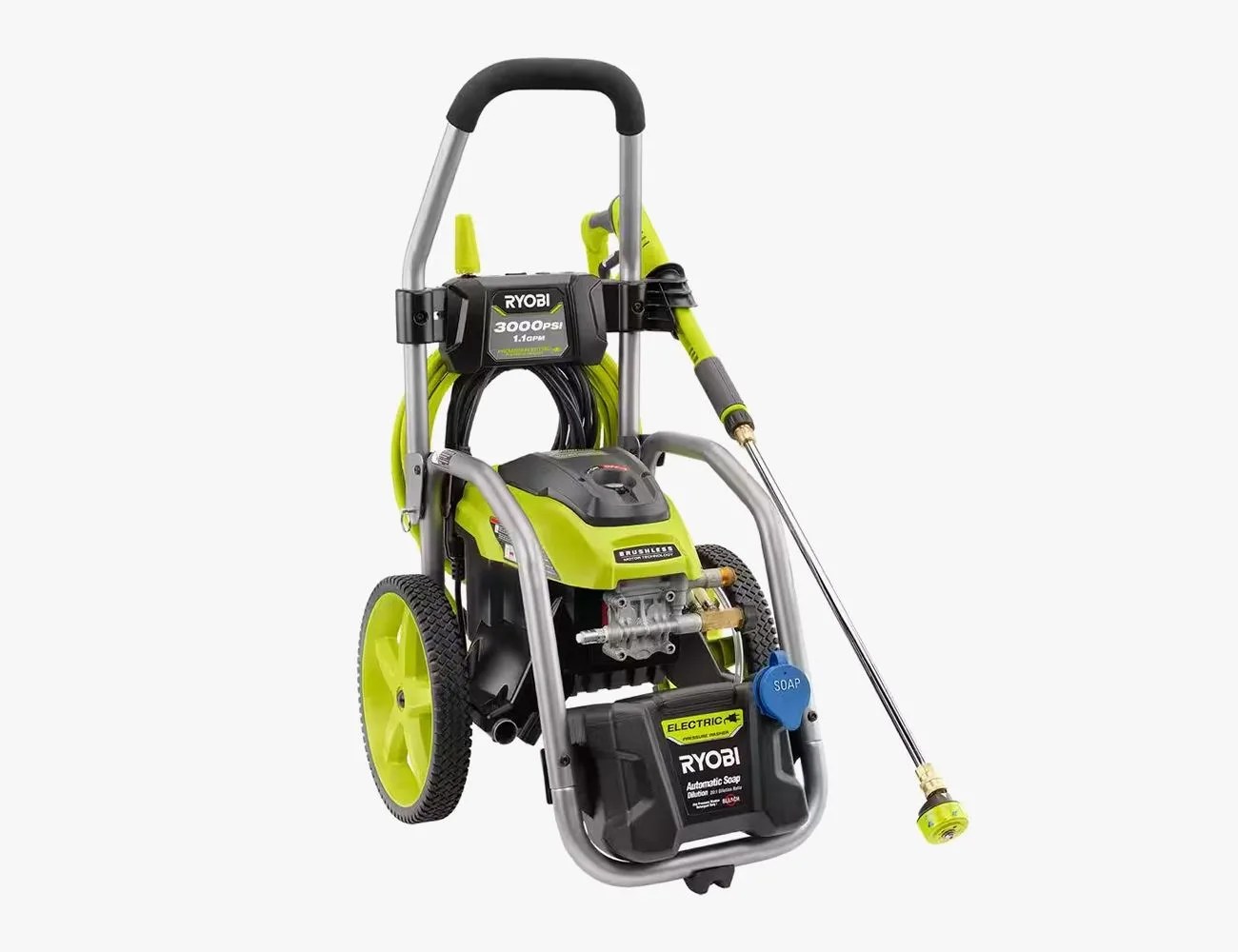 Home Depot
Home DepotBest Electric Pressure Washer
Ryobi 3000
Pros
- Simple to set up and use
- Offers consistent pressure for sustained periods
Cons
- Hose connections are too close to each other
- Turbo nozzle is needed for most jobs
- PSI: 3,000
- GPM: 1.1
- CU: 3,300
- Power: Electric
Ryobi’s electric pressure washer was great for our first-time pressure washer user — she had never set one up from scratch before, and Ryobi’s option made it simple to set up and start spraying in less than 10 minutes. While our tester used this pressure washer, she found that it maintained pretty standard pressure over sustained periods of use, although there was a lag between engaging the handle and the pressure kicking in of about 2 seconds.
Although it was easy to get going, our reviewer says there were some downsides to using this particular model. The ports for the high-pressure hose and the standard hose connection are too close to each other — it’s hard to unscrew the bottom hose without unscrewing the top hose first — and our reviewer thinks they’d be more useful and less frustrating if they were on either side of the motor.
[composite mediaId=’b2bce364-404e-4f75-bdf2-3e384dc8b0ba’][/composite]
The Ryobi is much more affordable than many other comparable 3,000-PSI power washers, but our tester found it was lacking the power she was looking for, and found herself wishing for more (this applies to the standard nozzle attachment; the turbo nozzle delivers 50% more power). Our tester ended up having the standard nozzle on its highest setting the entire time and adjusted her distance from her subject, rather than messing with the lower pressure settings due to their lack of sufficient power. For tougher messes or dirt that’s been stuck on for a while, our tester would recommend patience and a pre-soak, because the power wasn’t enough to wash off caked-on dirt right away.
Westinghouse WPX Max
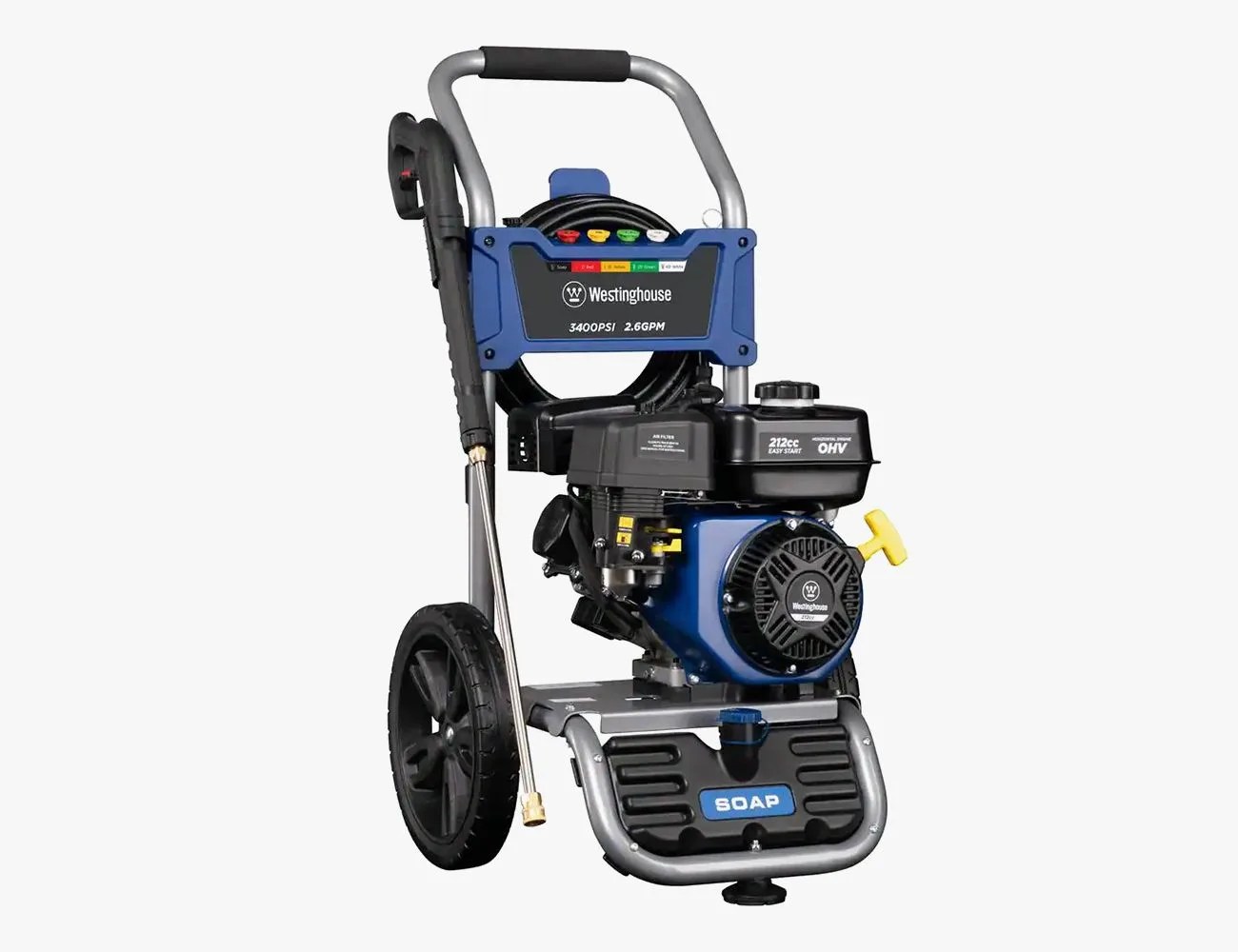 Home Depot
Home DepotBest Gas Pressure Washer
Westinghouse WPX Max
Pros
- Great CU bang-for-buck
- 5 quick-connect nozzles offer lots of versatility
Cons
- Pull start reliability may be an issue
- PSI: 3,400
- GPM: 2.6
- CU: 8,840
- Power: Gas
If you prefer to go with gas, you don’t have to go with an industrial-sized monster like the aforementioned DeWalt. For around the same price as many medium-duty electric models, you can get this heavy-duty gas power washer from Westinghouse. Its CU rating of 8,840 is extremely impressive, especially for the price, meaning this pressure washer can handle tougher jobs like driveway cleanings and deck restorations that similarly priced electric competitors will struggle with. Its five quick-connect nozzles make it easy to choose the right spray angle for your job, and there’s even an included soap tank for when you need to get sudsy — something you don’t always see on gas-powered models. It’s a little on the heavy side at 64 pounds, and it is a pull-start engine, with some reviewers complaining about the durability of the recoil cable.
Stanley SHP2150
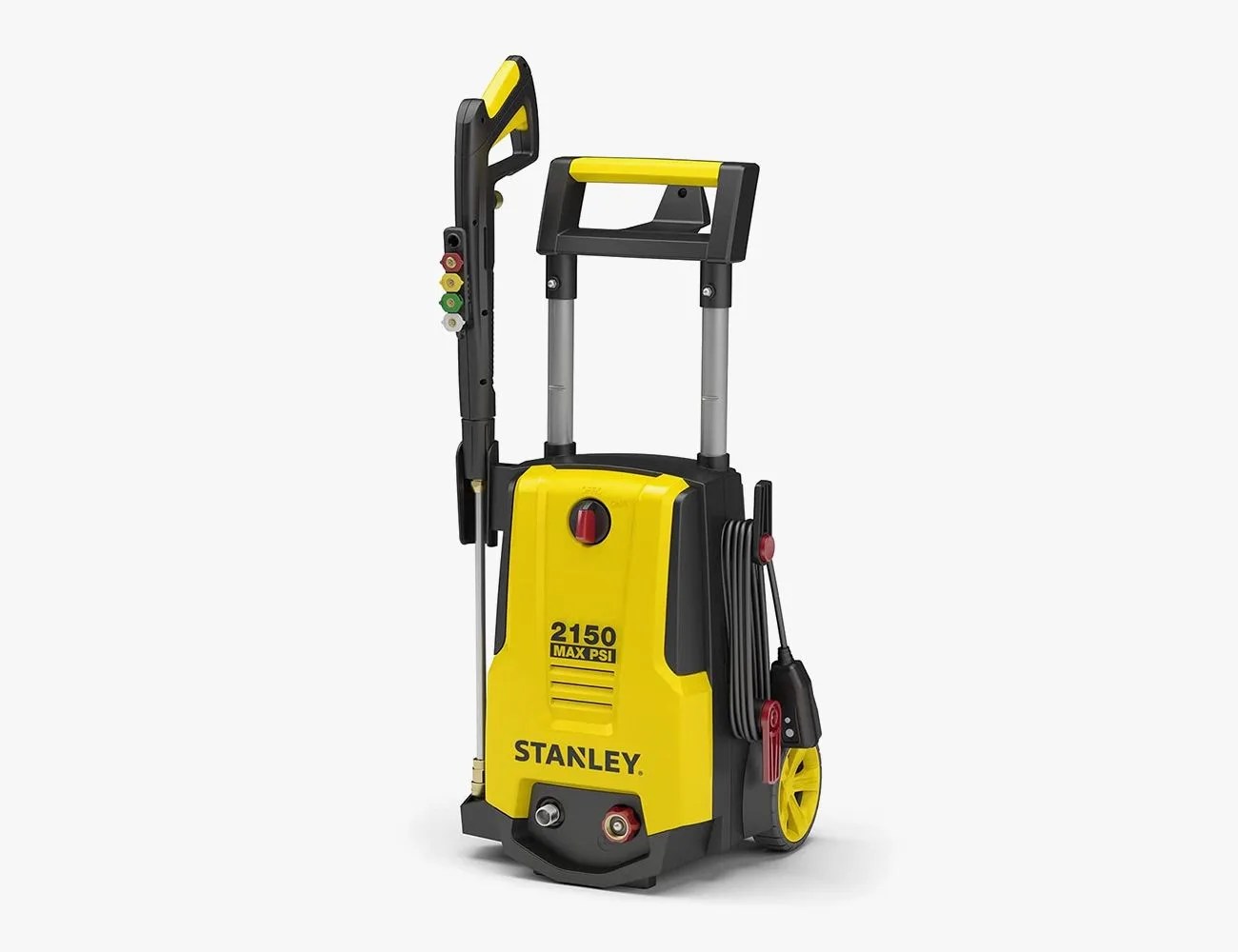 Amazon
AmazonBest Pressure Washer for Cars
Stanley SHP2150
Pros
- Includes a high-pressure soap foam cannon
- Extremely light at 27lb
Cons
- Struggles with jobs that are tougher than washing a car
- PSI: 2,150
- GPM: 1.4
- CU: 3,010
- Power: Electric
You don’t want to go overboard with power when washing your car — keep that PSI below, 2,200 please — but you don’t want anything too light, either. Maxing out at 2,150 with a decent 1.4 GPM to go with it, this power washer has the perfect output to give your car a good deep clean, and quickly. But what truly makes this perfect for cleaning your car is the included high-pressure soap foam cannon. Attach this to the end of your hose and the SHP2150 essentially turns into a mobile car wash, blasting out a thick layer of foam that’s usually impossible to replicate at home. It also weighs a puny 27 pounds, making it easy to maneuver around your vehicle. And while you can technically use this Stanley for other pressure-washing duties, in most non-car-washing cases, you’re going to want something more powerful.
